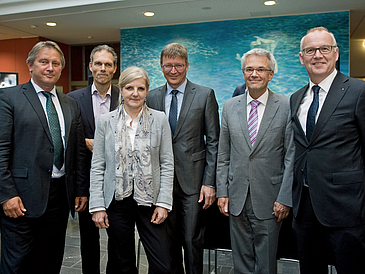The “Bremen Spirit”
Bernd Scholz-Reiter sketched the history of the University. It was not “founded by princes or clergy” but as a “red cadre”. These beginnings marked its willingness to experiment, its outstanding capacity for cooperation and relish for constructive argument, “something we like to refer to as the Bremen Spirit.” He illustrated this with the tenure track for junior professors introduced 15 years ago, which has subsequently become known as the “Bremen Perspective”. This was around the same time as the University created reliable career paths for its mid-level faculty. The “U Bremen Research Alliance” is yet another shining example of extended cooperation. “More than 50 cooperation professors work at the University of Bremen, 40 of them in research institutions run by the Federal Government and the Länder”, said Scholz-Reiter. As an example of the University‘s participatory approach, he described the process surrounding development of the University’s strategy for the years 2018 to 2028. The underlying strategy paper is currently being interactively discussed in a transparent online consultation process that reaches a large number of University members. “More than 240 comments and 700 likes” have already been registered.
Praise for Open Campus
In his introductory remarks, Professor Peter Gumbsch, Chairman of the Science Commission of the Science Council, described the formation of science clusters as an indispensible future necessity. “Today, competitive calls are won on the basis of cooperation and collaborative agreements”, he said. The maritime flair present at MARUM and the noticeable proximity to the ocean inspired him to draw a comparison to the coordinated behavior of swarm fish, likening this to the founding of the “U Bremen Research Alliance” in 2016, which constitutes “an initial step towards forming a swarm”. With a quote from Alexander von Humboldt “Knowledge and cognition are both the joy and the justification of mankind”, he praised OPEN CAMPUS, the University’s open day, which enables the public at large to participate in “the joy of cognition “.
Tour of the core repository
55 distinguished guests gathered in the foyer of the building in Leobener Straße, where in a relaxed atmosphere they were able to listen to classical jazz, enjoy a variety of culinary delights, and experience several interesting speakers. Another much-appreciated highlight of the day was a tour of the core repository, or drill-core archive, which Professor Michael Schulz had invited them to.
More information on the meeting of the Science Council under: http://unihb.eu/jkIXoX9o

